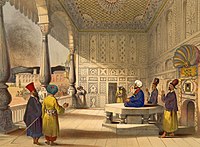This article needs additional citations for verification .(January 2017) |
This is a list of the governors of the province of Kandahar, Afghanistan.
| Governor | Period | Extra | Note | ||
|---|---|---|---|---|---|
| Muhammad 'Amin Khan | ?-1865 | Governor of Kandahar, revolted against Sher Ali Khan in 1865 but the rebellion was crushed and he was killed. [1] | |||
| Sardar Mir Afzal Khan | ?-1878 | Sardar Mir Afzal Khan (son of Pur Dil Khan and father of Sardar Abdul Wahab Khan - governor of Mazar-i-Sharif in 1914 [2] ) was the governor of Kandahar up until the start of the Second Anglo-Afghan War before leaving for Persia upon the approach of the British. [3] | |||
| Mohammad Hassan Khan | April 1881-July 1881 | Appointed by Amir Abdur Rahman Khan after withdrawal of British forces from Afghanistan after the second Anglo-Afghan war. | [4] | ||
| Mohammad Ayub Khan | July 1881-September 1881 | Defeated Mohammad Hassan Khan and briefly ruled the province for the first time before being defeated by Amir Abdur Rahman Khan. | [4] | ||
| Nur ul-Haq Ulumi | 1989 1992 | ||||
 | Gul Agha Sherzai | 1992 1994 | |||
| Mohammad Hasan Rahmani | 1994 2001 | [5] | |||
 | Gul Agha Sherzai | December 2001 16 August 2003 | |||
| Yousef Pashtun | August 2003 2005 | ||||
 | Asadullah Khalid | 2005 August 2008 | |||
| Rahmatullah Raufi | August 2008 4 December 2008 | ||||
 | Toryalai Wesa | 4 December 2008 2014 | |||
| Hamid Masood | 2014 2015 | ||||
| Humayun Azizi | 27 April 2015 21 May 2017 | ||||
 | Zalmai Wesa | 21 May 2017 18 October 2018 | |||
| Hayatullah Hayat | 18 October 2018 3 January 2021 | ||||
| Rohullah Khanzada | 3 January 2021 12 August 2021 | [6] | |||
| Muhammad Yousuf Wafa | 12 August 2021 March 2023 | [7] | |||
| Mullah Shirin Akhund | March 2023 Present | ||||
| History of Afghanistan |
|---|
 The palace of the emir in 1839 |
| Timeline |
